

Stuff. Tests. Dream Analysis and Interpretation - Understanding Dreams. The Mortality Paradox. What Is Thought? By Eric B. Baum, 2004 Text - Physics Forums Library. Here are some of my favorite excerts from the new book "What Is Thought?
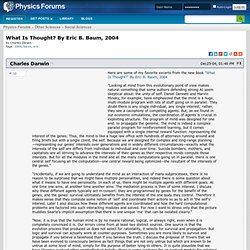
" By Eric B. Baum, 2004 "Looking at mind from this evolutionary point of view makes natural something that some authors defending strong AI seem skeptical about: the unity of self. Daniel Dennett and Marvin Minsky, for example, have emphasized that the mind is a huge, multi-module program with lots of stuff going on in parallel. They doubt there is any single individual, any single interest; rather, they see a cacophony of competing agents.
Heimberg2.pdf (application/pdf Object) What It Feels Like to Be Suicidal. Interesting piece on suicidal ideation in Scientific American.
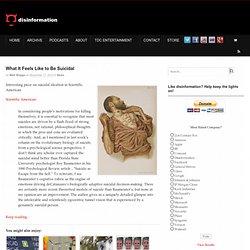
Scientific American: In considering people’s motivations for killing themselves, it is essential to recognize that most suicides are driven by a flash flood of strong emotions, not rational, philosophical thoughts in which the pros and cons are evaluated critically. And, as I mentioned in last week’s column on the evolutionary biology of suicide, from a psychological science perspective, I don’t think any scholar ever captured the suicidal mind better than Florida State University psychologist Roy Baumeister in his 1990 Psychological Review article , “Suicide as Escape from the Self.” Mindfulness meditation may improve decision making. 12-Feb-2014 [ Print | E-mail ] Share [ Close Window ] Contact: Anna Mikulakamikulak@psychologicalscience.org 202-293-9300Association for Psychological Science.
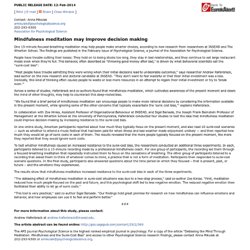
Personality - Find Your Type. Neurosis. Symptoms and causes[edit] There are many different neuroses: obsessive–compulsive disorder, obsessive–compulsive personality disorder, impulse control disorder, anxiety disorder, hysteria, and a great variety of phobias.
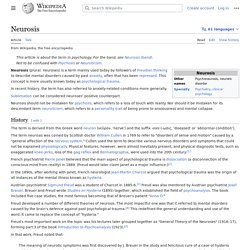
According to C. George Boeree, professor emeritus at Shippensburg University, the symptoms of neurosis may involve: Emerging from the Dark Age: The Revival of Psychedelic Medicine. The return flight from Switzerland was a mix of hope and solemnity for Rick Doblin, the only American to attend the funeral of Dr.
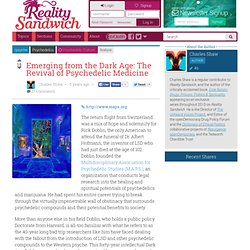
Albert Hofmann, the inventor of LSD who had just died at the age of 102. Doblin founded the Multidisciplinary Association for Psychedelic Studies (M.A.P.S.), an organization that conducts legal research into the healing and spiritual potentials of psychedelics and marijuana. He had spent his entire career trying to break through the virtually impenetrable wall of obstinacy that surrounds psychedelic compounds and their potential benefits to society. The Three Doors of Serendip: Exhibit Index.
Minnesota Multiphasic Personality Inventory. The Minnesota Multiphasic Personality Inventory (MMPI) is the most widely used and researched standardized psychometric test of adult personality and psychopathology.[1] Psychologists and other mental health professionals use various versions of the MMPI to develop treatment plans; assist with differential diagnosis; help answer legal questions (forensic psychology); screen job candidates during the personnel selection process; or as part of a therapeutic assessment procedure.[2] The original MMPI, first published by the University of Minnesota Press in 1943, was replaced by an updated version, the MMPI-2, in 1989.
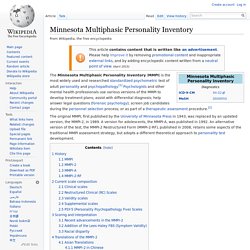
A version for adolescents, the MMPI-A, was published in 1992. An alternative version of the test, the MMPI-2 Restructured Form (MMPI-2-RF), published in 2008, retains some aspects of the traditional MMPI assessment strategy, but adopts a different theoretical approach to personality test development. History[edit] 16PF Questionnaire. The Sixteen Personality Factor Questionnaire (16PF), is a self-report personality test developed over several decades of empirical research by Raymond B.
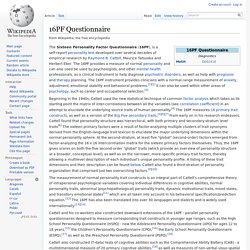
Cattell, Maurice Tatsuoka and Herbert Eber. The 16PF provides a measure of normal personality and can also used be used by psychologists, and other mental health professionals, as a clinical instrument to help diagnose psychiatric disorders, as well as help with prognosis and therapy planning. The 16PF instrument provides clinicians with a normal-range measurement of anxiety, adjustment, emotional stability and behavioral problems.[1][2] It can also be used within other areas of psychology, such as career and occupational selection.[3] Outline of Questionnaire[edit] My Experience (Cosmic Serpents, Psychedelic Entities, Astral Beings)
Anxiety, Depression & Addiction - 3 Common Mental Health Issues Treatable with Psychedelics. Anna Hunt, Staff WriterWaking Times Despite the complicated social perspective regarding psychedelics, more research and attention is being given to the use of psychedelic substances such as lysergic acid diethylamide (LSD), psilocybin mushrooms, and plants such as ayahuasca to treat mental illnesses, including depression, anxiety, alcoholism and drug addiction.
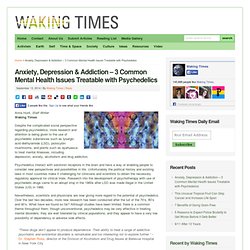
Psychedelics interact with serotonin receptors in the brain and have a way of enabling people to consider new perspectives and possibilities in life. Unfortunately the political history and existing laws in most countries make it challenging for clinicians and scientists to obtain the necessary regulatory approval for clinical trials. Empath Heartbreak. 242 manually selected sites about Personality Psychology. Six Habits of Highly Empathic People. Three Kinds of Empathy: Cognitive, Emotional, Compassionate. Being cool in crisis seems essential for our being able to think clearly.
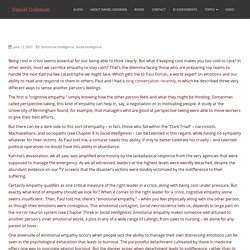
But what if keeping cool makes you too cold to care? The Science of Stress and How Our Emotions Affect Our Susceptibility to Burnout and Disease. By Maria Popova.
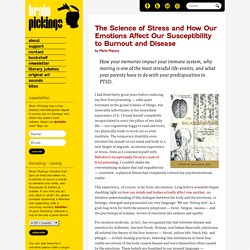
The Three Doors of Serendip: Exhibit Index. ₪₪₪ Socionics - The New Psychology ₪₪₪ Focus on Brain Disorders - Bipolar Disorder - Aetiology. What happens in the brain? The two main neuroanatomic circuits involved in mood regulation are: the limbic-thalamic-cortical circuit the limbic-striatal-pallidal-cortical circuit. A dysfunction in any brain region associated with these mood-regulating circuits may lead to the development of a mood disorder. However, it is not certain whether a disturbance to these areas of the brain causes the onset of mood disorders or whether they are affected during the course of the disease. It is possible that abnormalities in these circuits confer a biological vulnerability, which when combined with environmental factors cause mood disorders (Soares & Mann, 1997). The main brain areas involved in bipolar disorder include the frontal and temporal lobes of the forebrain, the prefrontal cortex, the basal ganglia and parts of the limbic system.
Structural imaging studies have recently demonstrated a neuroanatomical basis to bipolar disorder (Manji & Lenox, 2000). Premature cognitive commitment. An opinion about reality that cannot be changed by any contrary evidence or persuasion. This applies to anyone close-minded and stubborn enough to say, "Not only do I think I'm right, but no amount of evidence will ever convince me that I'm wrong. " Technically speaking, refers to a basic cognitive activity where invariant perceptions become permanently encoded by the nervous system--even after the sense data do begin to vary. Usually this is sound evolutionary practice: e.g. if I cognitively commit to the fact that apples are edible, I'll have an easier time nourishing myself than if I had to rediscover the apple every time.
I first heard this phrase used by Deepak Chopra in a lecture of which the following is an excerpt: Psychopathic Personality. When We Are a Fool to Ourselves. Accessing our own higher mental processes is often difficult. Free Psychic Test Online! Are You Clairvoyant? Check Right Now! Crime Times- linking brain dysfunction to disordered/ criminal/ psychopathic behavior. 8 Destructive thinking patterns and how to change them. Psychology Today: Ten Politically Incorrect Truths About Human Nature. Welcome to socionics.com! Topic: Anger. Anger is an emotion characterized by antagonism toward someone or something you feel has deliberately done you wrong. Psychoanalysis Terms. Discovering Assumptions. What is a logical fallacy?
Logical Problems - Very Easy. Logic Puzzles. 10 simple ways to save yourself from messing up your life - Stepcase Lifehack. Stop taking so much notice of how you feel. Model Theory. Philosophy since the Enlightenment, by Roger Jones. Mental Heuristics Page. Critical thinking web. Social alienation. Existentialism (Stanford Encyclopedia of Philosophy) Philosophy of mind: Definition and Much More from Answers.com. Spotting Emotional Manipulation.
Mind-mapping. Psychology 102: Educational Psychology Course - Free Online Video Lessons. Psychology & Culture. 8 Ways to Help Your Bipolar Loved One Cope - Beyond Blue.